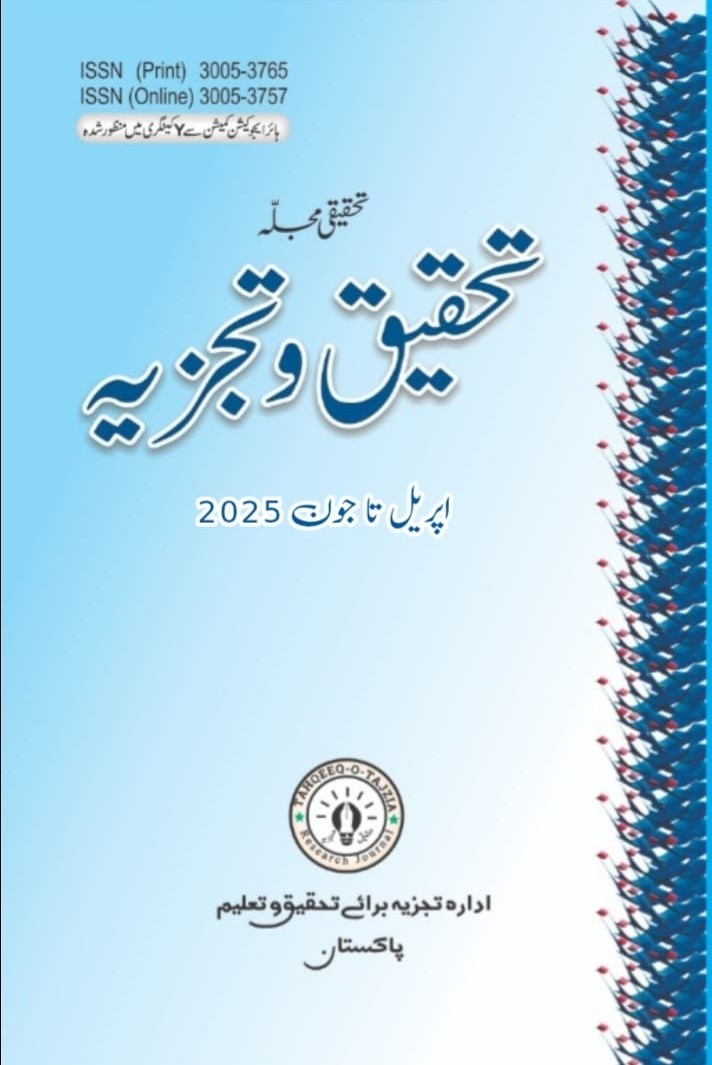Psychology in The Fictional Criticism Of Dr.Saleem Akhtar
Keywords:
Saleem Akhtar, Psychoanalytical Criticism, Urdu Short Story, Psychological Approach, Madrasana Tanqeedi Rivaayat, Urdu Literary Criticism, Character Analysis, Subconscious in LiteratureAbstract
Dr. Saleem Akhtar is one of the most distinguished figures in Urdu literary criticism, particularly known for introducing and developing psychoanalytical approaches within the field. This paper explores his critical methodology with a special focus on his psychoanalytical interpretation of Urdu short stories. It highlights how Saleem Akhtar, through a deep engagement with the subconscious motives of characters and the internal world of writers, offers a nuanced understanding of fiction that transcends the limitations of traditional academic criticism, often labeled as "madrasana tanqeedi rivaayat" (pedagogical criticism). While acknowledging that psychoanalysis alone cannot offer a complete interpretation of literary texts, the paper argues that Akhtar's approach allows access to the unseen psychological dimensions of narratives. It also reflects on the distinctions between pedagogical and scholarly criticism in Urdu, using examples from other critics, and situates Saleem Akhtar's contributions within the broader discourse of literary theory in South Asia.
References:
- Akhtar, Dr. Saleem. A Psychological Study of Fictional Technique, in: Afsana aur Afsana Nigaar. Lahore: Sang-e-Meel Publications, 1991, p. 18.
- , p. 16.
- , p. 16.
- , pp. 22–23.
- Cited in: Kareem, Irtiza. Urdu Fiction ki Tanqeed. Lahore: Kitab Dunia, 1999, p. 439.
- Akhtar, Dr. Saleem. A Psychological Study of Fictional Technique, in: Afsana aur Afsana Nigaar, p. 19.
- , “Jadeed Afsana”, in: Ibid., p. 58.
- , “Urdu ka Pehla Jinsi Afsana”, in: Afsana aur Afsana Nigaar, p. 91.
- Alamgir, Dr. Aurangzeb. Sajjad Haider Yildirim: A Research and Critical Study. Lahore: Sangat Publishers, 2005, p. 74.
- Cited in: Rifat, Syed Mubarzuddin. “A View on Khayalistaan”, in: Khayalistaan by Sajjad Haider Yildirim. Lahore: Sang-e-Meel Publications, 1996, p. 14.
- Akhtar, Dr. Saleem. “Urdu ka Pehla Jinsi Afsana”, in: Afsana aur Afsana Nigaar, p. 98.
- , “Baghawat ka Isti‘ara – Manto”, in: Ibid., p. 149.
- Ahmed, Dr. Anwar. “The Role of Dr. Saleem Akhtar in the Criticism of Urdu Fiction”, in: Yak Ja. Multan: Beacon House, 1997, p. 150.
- Akhtar, Dr. Saleem. “Women in Urdu Fiction”, in: Afsana aur Afsana Nigaar, p. 105.
- , “Adab aur Asri Aagahi – Afsana”, in: Ibid., p. 26.
- , “Jadeed Afsana”, in: Ibid., p. 57.
- Kareem, Dr. Irtiza. Urdu Fiction ki Tanqeed, pp. 441–442.
Bibliography:
Ahmed, Anwar. The Role of Dr. Saleem Akhtar in the Criticism of Urdu Fiction. In Yak Ja. Multan: Beacon House, 1997.
Akhtar, Saleem. Afsana aur Afsana Nigaar. Lahore: Sang-e-Meel Publications, 1991.
Alamgir, Aurangzeb. Sajjad Haider Yildirim: A Research and Critical Study. Lahore: Sangat Publishers, 2005.
Kareem, Irtiza. Urdu Fiction ki Tanqeed. Lahore: Kitab Dunia, 1999.
Rifat, Syed Mubarzuddin. “A View on Khayalistaan.” In Khayalistaan, by Sajjad Haider Yildirim. Lahore: Sang-e-Meel Publications, 1996.
Downloads





